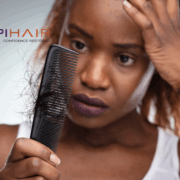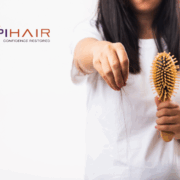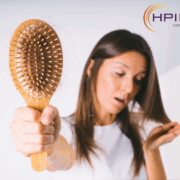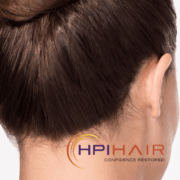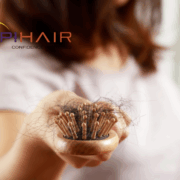Causes Of Women’s Hair Loss in Nashville, TN
Combat hair loss with expert guidance and personalized solutions today.
Are you experiencing more hair fall than usual? For many women, hair loss can be a frustrating and distressing issue. There are several factors that can contribute to hair loss in women, ranging from genetic predisposition to lifestyle habits and underlying health conditions. Understanding the causes of hair loss is the first step in finding effective solutions to address this concern. In this comprehensive guide, we will delve into the various factors that can lead to women’s hair loss, providing valuable insights to help you identify the underlying reasons and seek appropriate treatments.
Genetic Predisposition
While many women may associate male-pattern baldness with genetic predisposition, it’s important to note that female-pattern hair loss is also influenced by genetics. If there is a family history of hair thinning or baldness on either the maternal or paternal side, you may be predisposed to experiencing similar hair loss patterns. Genetic predisposition can play a significant role in the onset of hair loss, causing the hair follicles to become increasingly sensitive to the hormone dihydrotestosterone (DHT), which can lead to miniaturization of hair follicles and eventual hair loss.
Hormonal Imbalance
Hormonal changes can have a profound impact on hair health for women. Fluctuations in hormone levels, particularly during pregnancy, menopause, or even as a result of certain medical conditions, can trigger hair loss. The hormonal changes can disrupt the natural hair growth cycle, leading to increased hair shedding and decreased hair thickness. Conditions such as polycystic ovary syndrome (PCOS) or thyroid disorders can also contribute to hormonal imbalances, further exacerbating hair loss.
Stress and Anxiety
Chronic stress and anxiety can take a toll on overall health, and the impact is often reflected in the hair. Stress can disrupt the normal hair growth cycle, leading to increased shedding and impaired hair growth. The body’s response to significant stress can result in a condition called telogen effluvium, where a larger-than-normal proportion of hair follicles prematurely enter the resting phase and subsequently shed. Managing stress through relaxation techniques, exercise, and adequate sleep can help mitigate the impact on hair health.
Diet and Nutrition
A well-balanced diet is essential for healthy hair growth. Inadequate intake of essential nutrients, such as iron, protein, and certain vitamins and minerals, can contribute to hair loss. Poor nutrition can affect the hair follicles, leading to slow hair growth, increased shedding, and reduced hair strength. Ensuring a diet rich in fruits, vegetables, lean proteins, and healthy fats can support optimal hair health.
Medical Conditions
Several medical conditions can manifest in hair loss as a symptom, including autoimmune disorders, alopecia areata, and certain skin conditions that affect the scalp. Identifying and addressing underlying medical conditions in collaboration with a healthcare professional is crucial in managing hair loss effectively.
Environmental Factors and Styling Habits
Environmental factors, such as exposure to pollutants, harsh chemicals, and UV radiation, can impact hair health. Additionally, excessive heat styling, tight hairstyles, and over-manipulation of hair can contribute to damage and breakage, leading to thinning hair over time. Being mindful of protective styling and using hair care products that promote healthy hair growth can help mitigate these environmental and styling-related factors.
Schedule Appointment
Appreciating the multifaceted nature of women’s hair loss is crucial in addressing this common concern effectively. By identifying the underlying causes and making informed lifestyle choices, women can take proactive steps to maintain and support optimal hair health. Seeking professional guidance from a qualified healthcare provider or trichologist can provide personalized recommendations to address specific hair loss concerns and promote regrowth.

